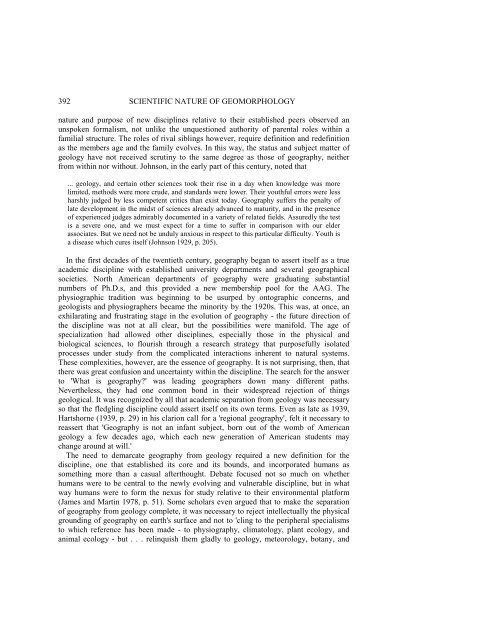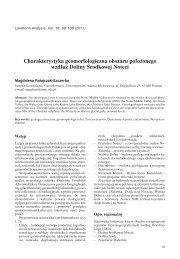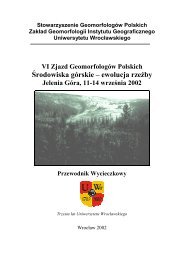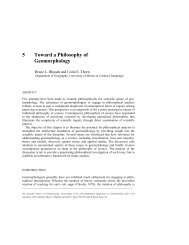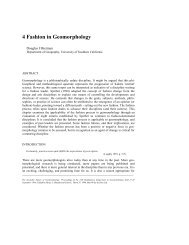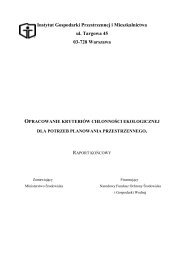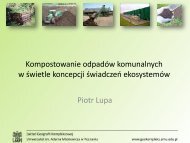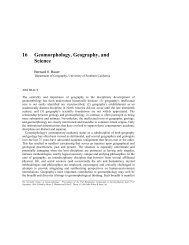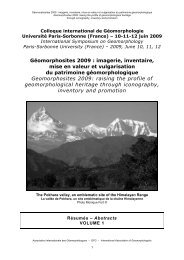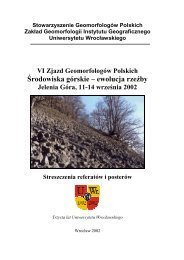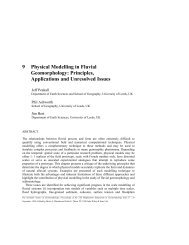Chapter 16 - Geomorphology, Geography, and Science Bernard 0
Chapter 16 - Geomorphology, Geography, and Science Bernard 0
Chapter 16 - Geomorphology, Geography, and Science Bernard 0
Create successful ePaper yourself
Turn your PDF publications into a flip-book with our unique Google optimized e-Paper software.
392 SCIENTIFIC NATURE OF GEOMORPHOLOGY<br />
nature <strong>and</strong> purpose of new disciplines relative to their established peers observed an<br />
unspoken formalism, not unlike the unquestioned authority of parental roles within a<br />
familial structure. The roles of rival siblings however, require definition <strong>and</strong> redefinition<br />
as the members age <strong>and</strong> the family evolves. In this way, the status <strong>and</strong> subject matter of<br />
geology have not received scrutiny to the same degree as those of geography, neither<br />
from within nor without. Johnson, in the early part of this century, noted that<br />
... geology, <strong>and</strong> certain other sciences took their rise in a day when knowledge was more<br />
limited, methods were more crude, <strong>and</strong> st<strong>and</strong>ards were lower. Their youthful errors were less<br />
harshly judged by less competent critics than exist today. <strong>Geography</strong> suffers the penalty of<br />
late development in the midst of sciences already advanced to maturity, <strong>and</strong> in the presence<br />
of experienced judges admirably documented in a variety of related fields. Assuredly the test<br />
is a severe one, <strong>and</strong> we must expect for a time to suffer in comparison with our elder<br />
associates. But we need not be unduly anxious in respect to this particular difficulty. Youth is<br />
a disease which cures itself (Johnson 1929, p. 205).<br />
In the first decades of the twentieth century, geography began to assert itself as a true<br />
academic discipline with established university departments <strong>and</strong> several geographical<br />
societies. North American departments of geography were graduating substantial<br />
numbers of Ph.D.s, <strong>and</strong> this provided a new membership pool for the AAG. The<br />
physiographic tradition was beginning to be usurped by ontographic concerns, <strong>and</strong><br />
geologists <strong>and</strong> physiographers became the minority by the 1920s. This was, at once, an<br />
exhilarating <strong>and</strong> frustrating stage in the evolution of geography - the future direction of<br />
the discipline was not at all clear, but the possibilities were manifold. The age of<br />
specialization had allowed other disciplines, especially those in the physical <strong>and</strong><br />
biological sciences, to flourish through a research strategy that purposefully isolated<br />
processes under study from the complicated interactions inherent to natural systems.<br />
These complexities, however, are the essence of geography. It is not surprising, then, that<br />
there was great confusion <strong>and</strong> uncertainty within the discipline. The search for the answer<br />
to 'What is geography?' was leading geographers down many different paths.<br />
Nevertheless, they had one common bond in their widespread rejection of things<br />
geological. It was recognized by all that academic separation from geology was necessary<br />
so that the fledgling discipline could assert itself on its own terms. Even as late as 1939,<br />
Hartshorne (1939, p. 29) in his clarion call for a 'regional geography', felt it necessary to<br />
reassert that '<strong>Geography</strong> is not an infant subject, born out of the womb of American<br />
geology a few decades ago, which each new generation of American students may<br />
change around at will.'<br />
The need to demarcate geography from geology required a new definition for the<br />
discipline, one that established its core <strong>and</strong> its bounds, <strong>and</strong> incorporated humans as<br />
something more than a casual afterthought. Debate focused not so much on whether<br />
humans were to be central to the newly evolving <strong>and</strong> vulnerable discipline, but in what<br />
way humans were to form the nexus for study relative to their environmental platform<br />
(James <strong>and</strong> Martin 1978, p. 51). Some scholars even argued that to make the separation<br />
of geography from geology complete, it was necessary to reject intellectually the physical<br />
grounding of geography on earth's surface <strong>and</strong> not to 'cling to the peripheral specialisms<br />
to which reference has been made - to physiography, climatology, plant ecology, <strong>and</strong><br />
animal ecology - but . . . relinquish them gladly to geology, meteorology, botany, <strong>and</strong>


